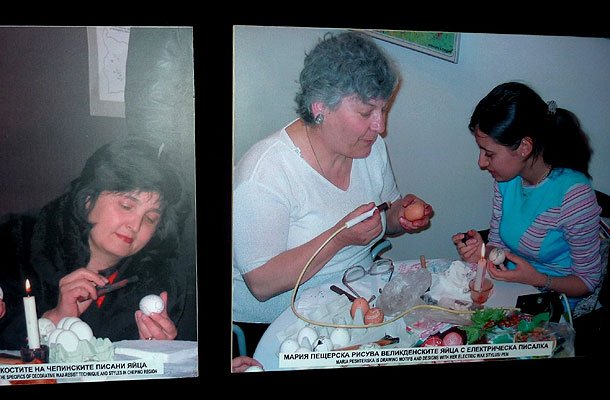Probably there are few museum exhibitions across the world dedicated to dyed Easter eggs. One of these exhibitions, however, is situated in the Museum of History in the Bulgarian town of Velingrad. Old traditions used for dying eggs are still preserved and used there. One of these techniques is using hot wax to draw different patterns on the egg. This method existed in the whole of Central and Eastern Europe in the past, as the wax is applied through a pin or a special type of pen. 
“One of the old techniques was using a rolled silver coin as a pen through which the wax drips,” ethnographer Georgi Kumanov from the Museum of History in Velingrad says. “In the 20th century these instruments were made from copper before electric types of pens used for dying eggs were created.”
We asked artists Daniela Tsopanova is she knew when people in Velingrad started to dye eggs in special ways.
“Nobody knows when this tradition for dying eggs emerged but the most important thing is that it still exists in Velingrad. When Easter comes the excitement can be felt in the atmosphere of the town. In order to make beautiful Easter eggs one needs beeswax and red dye. The traditional egg is red with white patterns. Floral designs are often used when the egg is dyed. The surface of the eggs is separated into equal parts and each part is filled with different ornaments. Flowers and leafs are often drawn as Easter is a spring holiday after all.” 
Wax is used to draw something on the egg before it is immersed in dye. The lines drawn with wax remain white. Different colors can also be achieved if the egg is dipped in a color before ornaments are drawn with wax and then the egg is dipped for a second time in darker dye. Colored types of waxes can also be used for creating intricate designs. In the past eggs were dyed with the use of natural products like onion skins, apples, walnuts. Some of these methods are still used today.
In a local kindergarten Daniela Tsopanova teaches the children to dye eggs using the wax technique, saying it is not difficult for them at all. 
“It is good that children start learning this art when they are 5 or 6 years old, as this helps preserve the traditions. We teach them various techniques in the applied art courses we organize for them. Our activities are diverse and they become acquainted with a number of traditional arts.”
The traditions of the Velingrad masters suppose that eggs must be fully dyed and the color that is most often chosen is red. Another traditional egg dying school is that of the town of Ihtiman. There eggs are not fully dipped in dye and different spots of them are colored while white areas are also left. Of course these masterfully decorated eggs are great for gifts during the holiday. Many of them are also sold as souvenirs in Velingrad. Eggs from various birds like geese and turkeys can also be used.
English: Alexander Markov
Bulgaria participates in the Global Money Week initiative for yet another year. Global Money Week is an annual global awareness-raising campaign to ensure that young people, from an early age, are financially aware, and are gradually acquiring the..
Bulgaria, as distant as a mirage, has become a beloved land for a man who has never set foot in this country. For nearly 50 years, Mr Jayanta Chakrabarti has been closely following everything that happens here and probably knows more about our history and..
The Republic of North Macedonia is in seven days of mourning. The town of Kočani, where a fire in a disco club took the lives of at least 59 people – mostly young people and children, aged 14 to 25 – is shrouded in silence today. "The..
People are increasingly freeing up space for technology that they manage and keep under control. Artificial intelligence is quickly..
An international conference “AI and education: The road to innovative teaching and learning” brings together 50 teachers from the Bulgarian schools..

+359 2 9336 661
